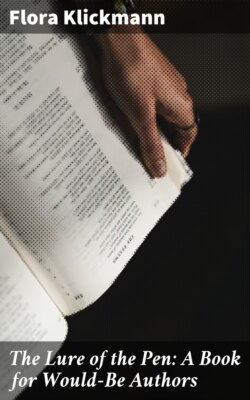Читать книгу The Lure of the Pen: A Book for Would-Be Authors - Flora Klickmann - Страница 6
На сайте Литреса книга снята с продажи.
Three Essentials in Training
ОглавлениеTable of Contents
"How am I to set about training for literary work?" is a question that is put to me most days in the year.
Training comes under three headings: Observation, Reading, and Writing.
The majority of beginners make the mistake of putting writing first; but before you can commit anything to paper, you must have something in your head to write down. If you have but little in your brain, your writing will be worthless.
We get out of Life what we put into it
Just as a plant requires special fertilisers if it is to develop fine blossoms and large fruit, so the mind requires food of exceptional nourishment if it is to produce something out of the ordinary, something worth reading.
It is one of the great laws of Nature that, as a general rule, we get out of life about what we put into it. If a farmer wants bumper crops, he must apply manure liberally to his land; if a man wants big returns from his business, he must devote much time and thought and energy to it. And in the same way, if you want good stuff to come out of your head, you must first of all put plenty of good stuff in.
But—and this is very important—it is not supposed to come out again in the same form that it went in! This point beginners often forget. When sweet peas are fed with sulphate of ammonia, they don't promptly produce more sulphate of ammonia; they utilise the chemical food to promote much finer and altogether better flowers. The same principle governs the application of suitable nourishment to all forms of life—the recipient retains its own personal characteristics, but transmutes the food into the power to intensify, enlarge, and develop those personal characteristics.
In like manner, the food you give your mind must be used to intensify and enlarge and develop your individuality; and what you write must reflect your individuality (not to be confused with egoism); it should not be merely a paraphrase of your reading.
All this is to explain why I put observation and reading before writing. They are the principal channels through which the mind is fed. And, in the main, the value of your early literary work will be in direct ratio to the keenness and accuracy of your observation, and the wisdom shown in your choice of reading.
You think this sounds like reducing writing to a purely mechanical process, in which genius does not count?
Not at all. It is merely that the initial stages of training for any work involve a certain amount of routine and repetition, until we have acquired facility in expressing our ideas.
In any case, very few of us are suffering from real genius. Ability, talent, cleverness, are fairly common; but genius is rare. If you possess genius, you will discover it quite soon, and, what is more important, other people will likewise discover it. As some one has said, "Genius, like murder, will out!" You can't hide it.
Meanwhile, it will save time and argument to pretend that you are just an ordinary being like the rest of us, with everything to learn; you will progress more rapidly on these lines than if you spend time contemplating, and admiring, what you think is a Heaven-sent endowment that requires no shaping.
